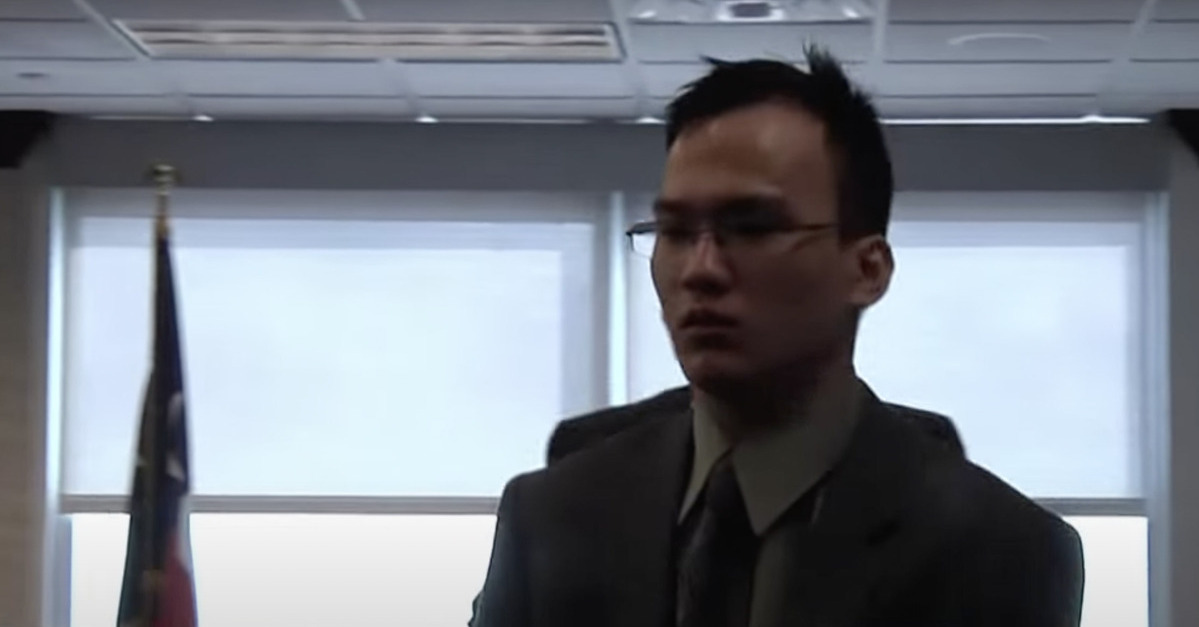
Gabriel Paul Hall
Justices of the Supreme Court have scheduled an unusual criminal appeal for their Jan. 6, 2023 conference: the case of a Texas inmate who was sentenced after a court used footage of a professional comedian’s roast as evidence against him.
Gabriel Paul Hall was convicted in 2015 of the 2011 murder of a retired Texas A&M University professor and disabled veteran Edwin Shaar and the stabbing of Shaar’s disabled wife Linda in their College Station home in 2011. At the time, Hall was an 18-year-old student at A&M Consolidated High School. Hall confessed to the crime, and was sentenced to death by a Texas state court.
According to Hall’s attorneys, Hall’s death sentence had not been a foregone conclusion simply because his crimes had been brutal and gruesome. Hall “was a slightly-built eighteen-year-old with no history of violence or criminal record. If he were spared, he would spend the rest of his natural life in a maximum-security prison, and no strong evidence indicated he would pose a danger there,” they said. Further, Hall was a product of an impoverished early childhood in “a squalid Philippine slum,” and later, of an abusive and neglectful adoptive home in the U.S.
During the penalty phase of Hall’s case, the presiding judge admitted footage of a 2015 Comedy Central film special (which never aired), featuring comedian Jeff Ross. The special had been taped at the Brazos County Detention Center, where Hall was held. The jail permitted Ross to record interviews with any inmate who signed a release, and according to court documents, even encouraged inmates to participate by posting flyers around the facility.
Once inmates signed up to participate, Hall says the nine-person film crew was given “essentially unfettered access to all areas of the jail” for three days. All the while, Hall says inmates’ lawyers were never contacted and inmates themselves were never counseled about the potential use of the footage.
During the taping, Ross, who Hall’s lawyers call “a professional insult comic,” spoke with Hall and other inmates during a 17-minute conversation. Clips of the exchanges were later used to demonstrate Hall’s lack of remorse for his crimes.
On appeal, Hall’s lawyers called the video “highly prejudicial,” in a way that could “only be fully appreciated by watching it.”
One exchange went as follows:
Ross to Hall: What are you in here for?
Hall: Ah …
Ross: Hacking somebody’s computer?
Hall: Something like that, yes.
Another inmate: ‘Hacking’ being the operative word.
Hall: Yeah. Yeah, used a machete on someone’s screen, so.
Another exchange began with Ross pointing at Hall and saying that he seemed like “a scary dude.” The following conversation followed:
Hall: Oh, come on, I wouldn’t hurt a fly.
Ross: What’s that?
Hall: I wouldn’t hurt a fly.
Ross: Really? What about a human?
Hall: Eh, they’re annoying. We’ll leave ’em to their own devices, so.
Hall appealed his death sentence and argued that the video violated his Sixth Amendment right to counsel. During Hall’s appeal in 2019, his attorney argued that Ross was a professional comedian who delivered a misleading portrayal of Hall by first provoking Hall by mocking his appearance and ethnic background, then saying that because Hall is Asian, he “must’ve done something crazy” to be in jail.
In Hall’s petition to SCOTUS, his lawyers explain their view of Ross’ celebrity: “Ross rose to prominence in the ‘comedy roast’ format, which places a premium on the host’s ability to deliver ‘outrageous’ jabs that provoke a subject into responding. He has been described as ‘the new millennium Don Rickles.'”
According to Hall’s petition, the video also included “hostile and dehumanizing statements about inmates and confinement generally,” such as a question, “How many [of you] guys have lied so much they don’t know the difference [any]more?”
The Texas Court of Criminal Appeals rejected Hall’s appeal, and said that Hall’s comments arguably evinced a lack of remorse. He now asks that SCOTUS overturn his death sentence on the basis that he was denied his Constitutional right to counsel.
Hall’s counsel argues that during the penalty phase of Hall’s trial, prosecutors “placed great emphasis on the video of Ross’s interview,” even playing the video twice for the jury.
What’s more, Hall’s lawyer argues, the video portrayed Hall in a way that was inherently prejudicial. Per the cert petition:
The video dehumanized Petitioner as a funny-looking, weird-acting foreigner; it contained comments mocking Petitioner’s demeanor and appearance, and it included oblique but hostile or belittling reference to Petitioner’s ethnic (Asian) heritage. And the video emphasized many false, unfair, and damaging stereotypes about inmates and prison (e.g., that prison is “like … summer camp,” a place inmates can “have some laughs [and] [t]alk about [sex]”). Each of these improper factors could easily have affected the jury’s view of whether the circumstances of Petitioner’s background justified leniency.
Hall’s appeal will be discussed at the justices’ next conference, then likely placed on the Court’s calendar for oral arguments.
[screengrab via YouTube/WKAGS]